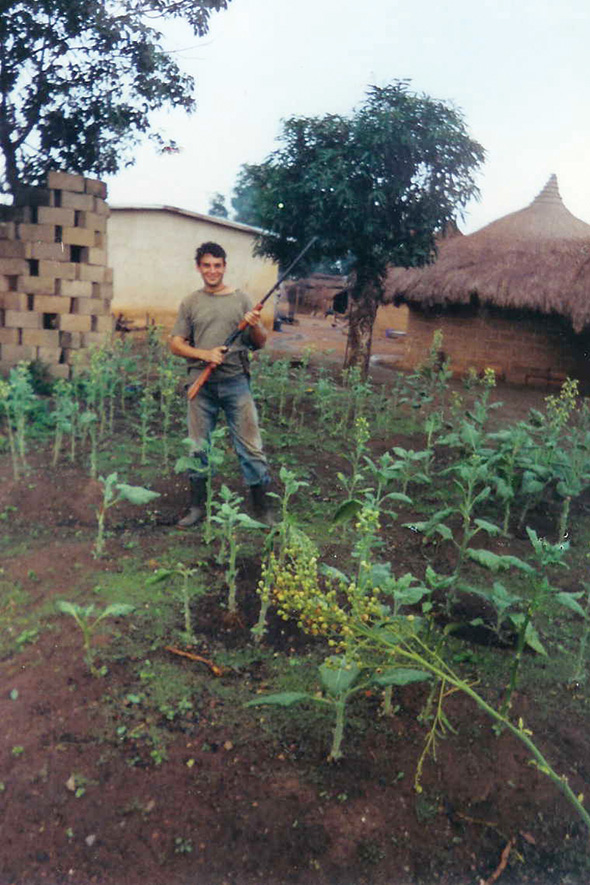Tony D’Souza gets more out of his travels than snapshots and souvenirs

Text by Kiira Mancasola
Tony D’Souza is not going to let the old writer’s adage, “Write what you know,” keep him from writing about what he’s passionate about—regardless of how far-flung or obscure the topic. With an ardor for re-search that could be considered downright obsessive, D’Souza achieves a level of authenticity in his novels that is both impressive and uncommon. While other writers in this day and age might turn to a simple Google search to learn more about the ‘wide, wide world,’ D’Souza puts on his shoes, grabs a shotgun, and heads out to the bush. “I like to think of myself as an international author,” he says. “I’ve traveled as a humanitarian worker. I’ve spent time in every country. I’ve spent time in countries off the beaten track that people will never go to… There’s a strangeness that feels comfortable to me.” And with two critically acclaimed novels under his young belt and a third in development, he gets more than just style points for his ballsy tactics.
The inspiration for D’Souza’s award-winning (New York Times Book Review Editor’s Pick, PEN Finalist, O.Henry Award and The Academy of Arts and Letters’ Sue Kaufman Award, to name just a few) first novel, Whiteman, came from the three years he spent in the Peace Corps, stationed in West Africa where he worked as a rural AIDS educator. You’d have to be of the New Criticism school not to draw parallels between the young protagonist (Jack) and D’Souza. And assume away, because D’Souza readily confirms the biographical analogies between the novel and his own experience in West Africa. His second novel, The Konkans, is equally well researched and this time, the story (and the location) are a little closer to home: “It comes from my family’s history. My father was born in India and my mom was a Peace Corps volunteer.” D’Souza’s family heritage is Konkan (Catholic Indians from Goa), a lesser-known population that evolved as the result of Portuguese colonization. “I wanted to bring a little known people to attention,” he relates.
Beyond his two successful novels, D’Souza somehow finds time to pursue poetry. But while his poems have been published individually, don’t expect to see a book of poetry from him anytime soon. When it comes to poetry—he’s keeping it casual. Says D’Souza, “Publishing books of poetry is not a priority for me. It’s a lot of work for little reward. My book agent is not going to rep a book of poetry…and I have to keep some things for myself that aren’t work or business related… I don’t have high ambitions for wining the Pulitzer.” In reality, a Pulitzer Prize is probably not too far-fetched for a writer who over the last three years has won a 2006 NEA Fellowship, a 2007 NEA Japan Fellowship and a 2008 Guggenheim (phew). Not to worry—even though a book of poetry isn’t on D’Souza’s horizons, his third novel is already underway.
Continuing the thematic interplay found in Whiteman and The Konkans, D’Souza describes his current project as: “a historical novel that came out of my research for my first two books. [It] looks at very early days of colonialism and beginning of slave trade. I’m kind of working backward through the theme.” Although his novels deal with weighty subjects, about which he’s really passionate—D’Souza’s writing is anything but depressing. “I’m writing about war and poverty, but also the daily lives of individuals,” he says. “There are a lot of colorful stories that aren’t told. You can find humor in anything. It could be ironic humor or twisted humor but I don’t want to be all gloom and doom.”
While non-fiction might seem like the most obvious vehicle for getting a message out—D’Souza believes that novels have the power to inform, but with more lasting impact. “Fiction, as a journalist, from my point of view, is a more demanding craft and produces something that will last longer,” he says. “Ultimately this stuff moves quickly and the next day brings the next news cycle. I’m looking to do stuff that is timeless.”
For an author with such a penchant for international themes, D’Souza is currently tackling a new kind of audience a little closer to home—his neighbors. D’Souza took a job at the local Dunsmuir, CA newspaper in July as a favor, but has since really embraced his narrow readership. “I’ve never worked for such a small market before,” he says. “ I really enjoy learning in depth about an area where I participate in civic life.” And why shouldn’t he? After all, he’s writing what he knows.

